IN A NUTSHELL

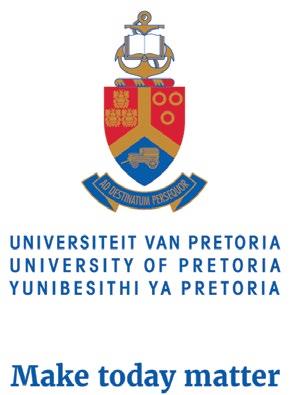



We believe that in every moment lies the potential to have a positive impact on the future and, in so doing, change the world for the better.
Build a compassionate, inclusive and humancentred university
Strengthen impact-driven research, partnerships and global collaboration
Nurture future-fit graduates who are equipped to thrive and lead in a complex and dynamic world
Embed regenerative and sustainable institutional practices that secure our institutional future and contribute to a sustainable planetary future
Be a driver of positive change and societal advancement


Our overall goal is to be a leading research-intensive university in Africa, recognised internationally for its quality, relevance and impact, and also for developing people, creating knowledge and making a difference locally and globally.
We offer the widest variety of research and study opportunities in South Africa.
9 Faculties: Economic and Management Sciences • Education • Engineering, Built Environment and Information Technology • Health Sciences • Humanities • Law • Natural and Agricultural Sciences • Theology and Religion • Veterinary Science
1 Business School: Gordon Institute of Business Science, ranked by the UK’s Financial Times as one of the leading business schools in the world (#32)
46 Research Chairs: Five research chairs focus on 4IR technologies and data integration to proactively solve current and future problems
126 Research entities: These include Centres of Excellence, Research Chairs, Bureaux, Institutes and Units
UP is ranked highly for its contribution to the United Nations Sustainable Development Goals (SDGs), which are designed to address the most serious and critical global challenges*
Top 50 in the world for impact
• #7 for SDG17 (Partnerships for the Goals)
• #36 for SDG1 (No poverty)
• #41 for SDG 16 (Peace, Justice and Strong Institutions)
• #45 for SDG 8 (Decent Work and Economic Growth)

#1 in Africa for SDG 16
We are ranked as the top university in Africa and South Africa for our role in promoting peace, justice and good governance on the continent*
*Source: 2025 Times Higher Education (THE) Impact Rankings
• NuMeRi: Africa’s only facility for nuclear medicine research
• Institute for Sustainable Malaria Control: Africa’s lead laboratory in malaria control
• Centre for Viral Zoonoses: A Centre of Excellence to study infectious diseases transmitted between animals and humans
• WHO Collaborating Centre: First of its kind in Africa for the prevention of deafness and hearing loss
• Brain Tumour and Translational NeuroScience Centre: First of its kind in South Africa
• Diabetes Research Centre: South Africa’s first exclusive Diabetes Research Centre at a public academic institution
• Centre for Asian Studies in Africa: A pioneering opportunity for research in Africa
• Future Earth Africa Hub Leadership Centre: First hub for the continent that focuses on advancing sustainability science
• Kumba VR Centre: First-ever Virtual Reality Centre for mine design in Africa
• Engineering 4.0: Africa’s first independent transport reference and testing facility
• Makerspace: First university in Africa to have a Library MakerSpace, a creative laboratory where students create prototypes and test ideas
• Centre for the Fourth Industrial Revolution (C4IR): UP hosts the South African Centre for Industry and Technology, the first SA member of the WEF’s global network of C4IR
• Veterinary Genetics Laboratory: World’s leading laboratory in DNA typing of rhinoceros
• Faculty of Veterinary Science: Only one of its kind in South Africa
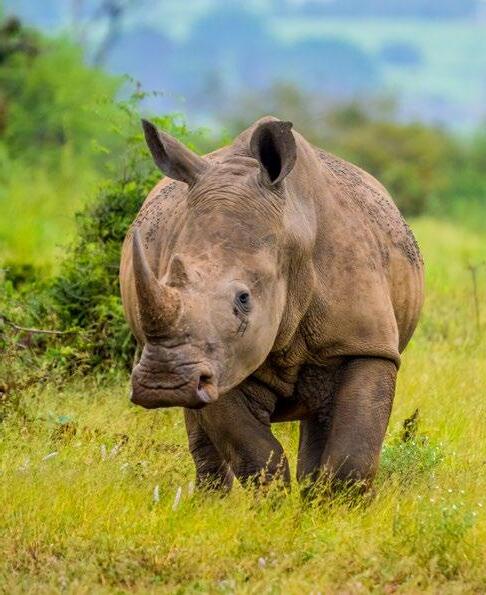
• With the most permanent academic staff to have a PhD (75.5%)
• With the most NRF-rated researchers (580)
• With our researchers recognised among the top 1% of the world

UP is leading a new way of thinking, where artificial intelligence (AI) and other immersive technologies are reshaping how students think and learn. Our academics are no longer mere transmitters of knowledge; they are mentors fostering problemsolving skills essential for the modern workplace.
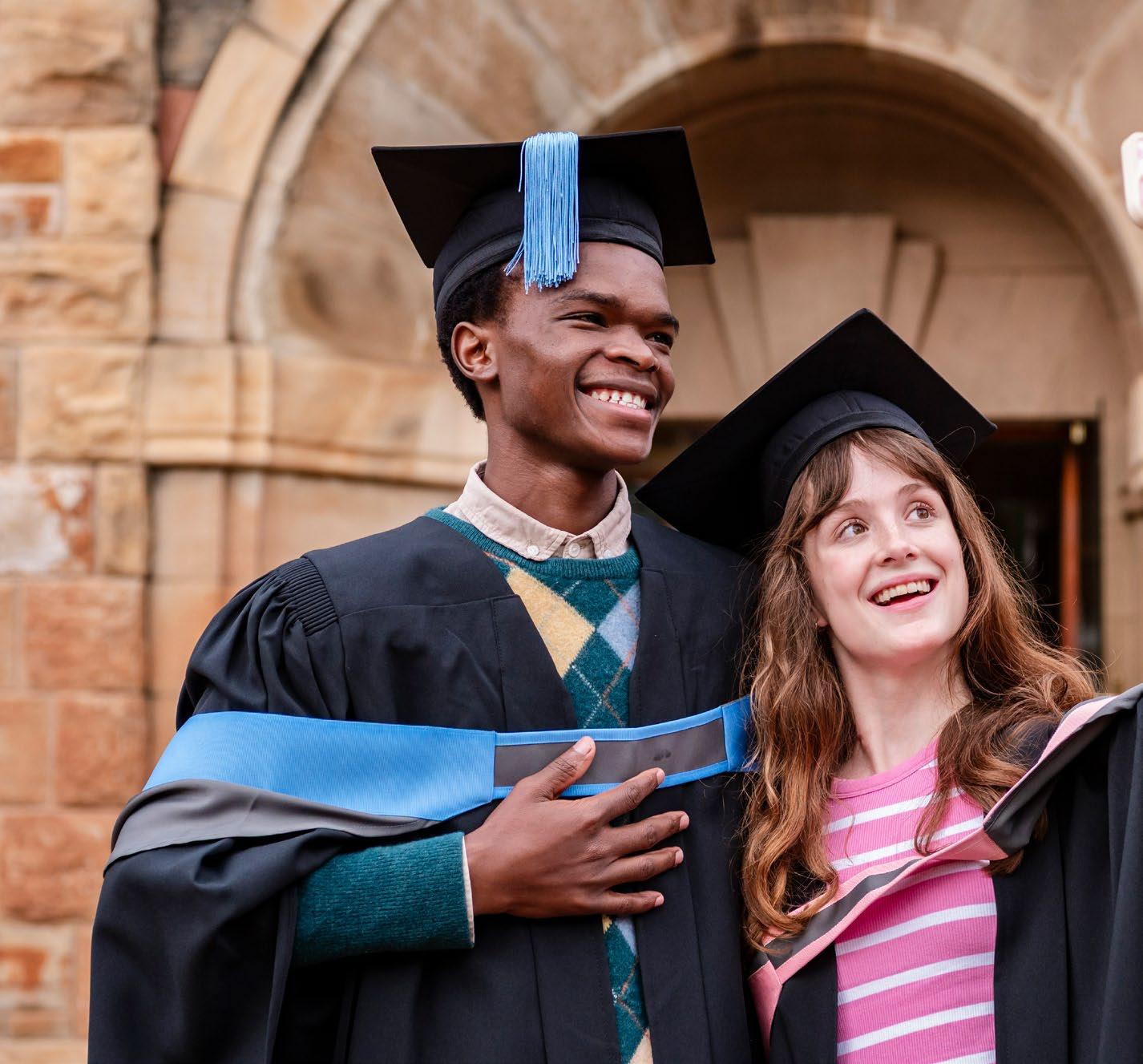


Generative AI is transforming every aspect of society, and the University of Pretoria (UP) is at the forefront of ensuring that both lecturers and students are equipped to navigate this technological shift. To support this transition, UP has developed comprehensive guidelines for the effective and responsible use of AI in teaching and learning, highlighting its potential benefits, limitations, and ethical considerations.
These guidelines empower instructors to thoughtfully integrate AI tools into their courses and encourage them to adapt their teaching and assessment strategies, ensuring that students are prepared for a world increasingly enhanced by AI. These efforts reflect UP’s commitment to fostering an innovative, responsible, and forward-thinking academic environment where technology can be leveraged to improve the learning experience and equip students for future success.
This culture of innovation is driven by our Digital Transformation Strategy and is evident in experiential learning methods such as gamification in tax education, and AI technologies in medical education assessment. We also implement culturally responsive teaching practices, which contribute to a more inclusive and holistic learning environment for students.
We intend for no one to be left behind in a future shaped by the Fourth Industrial Revolution.
Our students are already immersed in the University’s hybrid teaching and learning model, which equips students not only for academic success but also for the modern workforce. The model, called TEACH The UP Way, offers students the best of both worlds – online and contact learning – and encourages students to take control of their learning while also developing digital fluency.
TEACH The UP Way is a technology-enabled, flipped learning approach that encourages students to prepare independently for each class, allowing them to engage with and critically discuss issues during class time. Through Blackboard Learn™ (branded as clickUP) students come to class prepared, complete pre-class assessments, engage in class, and consolidate their knowledge after class. The roll out of the new clickUP Ultra has enhanced this educational experience through data-driven learning analytics to keep students engaged and on track for success.
By using Anthology Ally, UP makes digital content more accessible to a diverse range of students, especially those with learning disabilities or those for whom English is a second language. The software also leverages
machine learning to translate English documents into 25 languages, including Xhosa, catering to diverse linguistic needs. The Department of African Languages at UP has helped to translate documents into Zulu, further enhancing the accessibility and inclusivity of the learning experience.
In 2024, our e-Education Group in the Department of Education Innovation, won the Anthology Catalyst Award for Training and Professional Development for their innovative work in implementing clickUP Ultra to help lecturers reimagine course designs.
A new Immersive Technology Lab at the Department of Information Science aims to broaden access to immersive technology across the University community.

In 2024, our comprehensive tutoring programme was expanded to include 24/7 AI tutoring support alongside traditional tutoring services, making it a more accessible resource for students. To better monitor student participation and improve the effectiveness of tutoring, a QR codebased attendance tracking system is used.
Attention given to the HIMs (High Impact Modules) project in 2024 also paid off. The objective is to improve the success rates of modules with lower pass rates by identifying critical areas that require

support and focusing resources on these specific modules. The pass rate for these modules across faculties showed significant improvements with several notable success stories. As an example, the Faculty of Law improved all six of its HIMS by 28-30%.
We believe that such interventions have played a significant role in our improved pass rates. In 2024, the overall module pass rate for UP increased to 90% (2023: 88.2%), with the examination pass rate at 88% (2023: 87.4%).
We offer a number of support initiatives to ensure our students graduate successfully in time:
UP Readiness Survey assesses new first-year students’ preparedness for university.
The Academic Orientation Programme provides comprehensive support to encourage the success of first-year students.
Academic Success Coaches advise and refer students for the support or intervention they may require.
Online learning platforms ensure that students can attend a tutorial from wherever they are, or log in to work through the recorded tutorial.
The High Impact Modules project improves the success rate of modules that indicate a pass rate of below 70%, by providing targeted interventions.
Students with disabilities are supported through the Access, Disability and Inclusion Services (ADIS), which in 2024 provided support to 658 registered students across nine faculties, marking a year-on-year increase of 60 students.
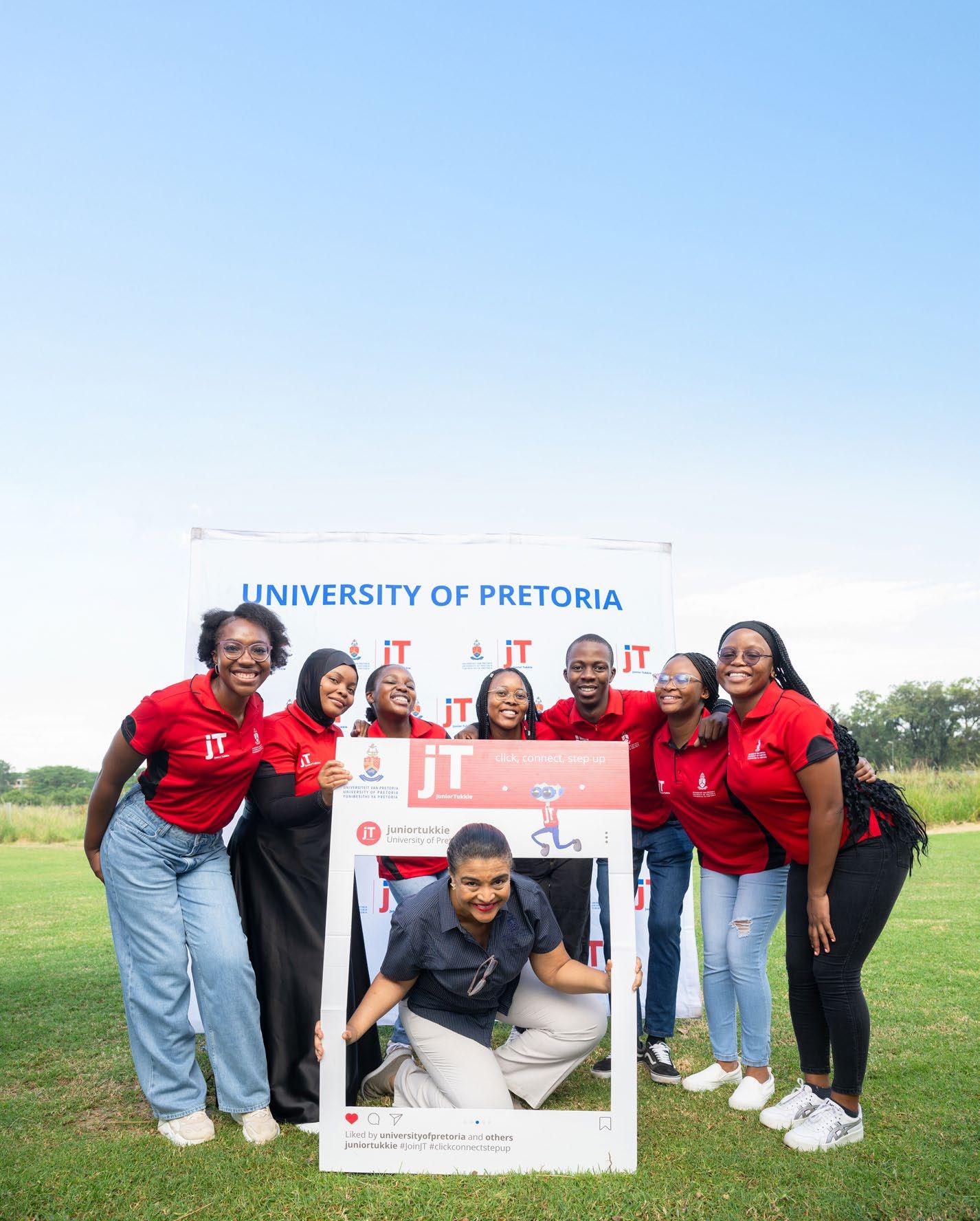
The University is also ensuring that South Africa has a pipeline of digital talent by helping learners prepare for this digital revolution. Our JuniorTukkie programme, which offers free study and subject support to high-school learners, celebrated its 20th birthday in 2024, while our flagship programme, Tuks Robot School, offers robotics and coding to motivate learners from township and rural schools. A notable example in 2024 was an AI workshop for learners in Mamelodi. The Pre-University Academy (UP-PUA) – established to bridge the gap between basic and higher education – once again partnered with Hong Kong Polytechnic University (HKPU) to deliver an AI pose recognition workshop to 99 local learners.
We regard a successful graduate as one who is also an employable graduate and we work steadily to position UP as a leader in career development and work readiness.
Our flagship programme, Ready for Work, is available via clickUP, the University’s learning management system. Through quizzes, videos and articles, the programme equips students with practical knowledge and skills to navigate the modern workplace confidently.
Students also have access to an Entrepreneurship programme, a free online course that teaches them how to use their knowledge, skills, and talents to launch their own ventures. This makes them job creators rather than job seekers.
The Career Services Office (CSO) received two prestigious awards from the South African Graduate Employers Association (SAGEA) in 2024: Best Career Services and Best Work Readiness Programme. These accolades underscore UP’s excellence in graduate recruitment, skills development, and strategic career guidance.
In 2024, the CSO launched the Final-Year Mentorship Programme, designed to connect final-year students (mentees) with industry professionals (mentors) for a structured experience lasting six to nine months.
Completion of the Ready for Work programme is a prerequisite for participation.
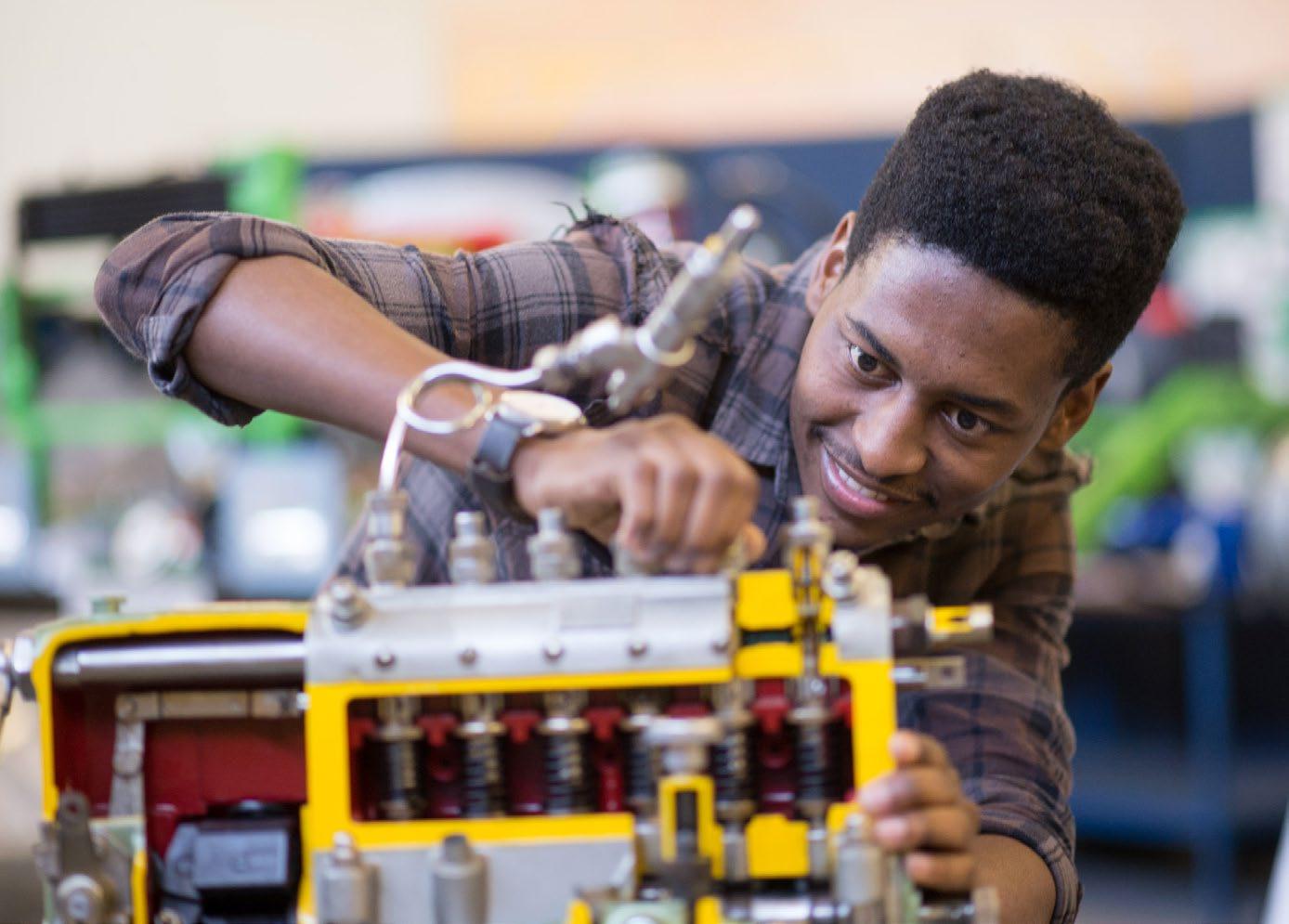
The Centre for the Future of Work (CFoW) at UP plays a critical role in preparing Africa’s youth for meaningful economic participation. In 2024, the CFoW launched a dedicated website to promote collaboration with external partners, reinforcing the importance of accessible, socially and economically relevant education.
UP’s commitment to producing workplaceready graduates has received global recognition. In the 2025 QS World University Rankings, the University was ranked among the top 250 universities in the world, and second in South Africa, for the Employer Reputation indicator. This affirms that UP graduates are valued by employers for their readiness to contribute meaningfully from the outset of their careers.
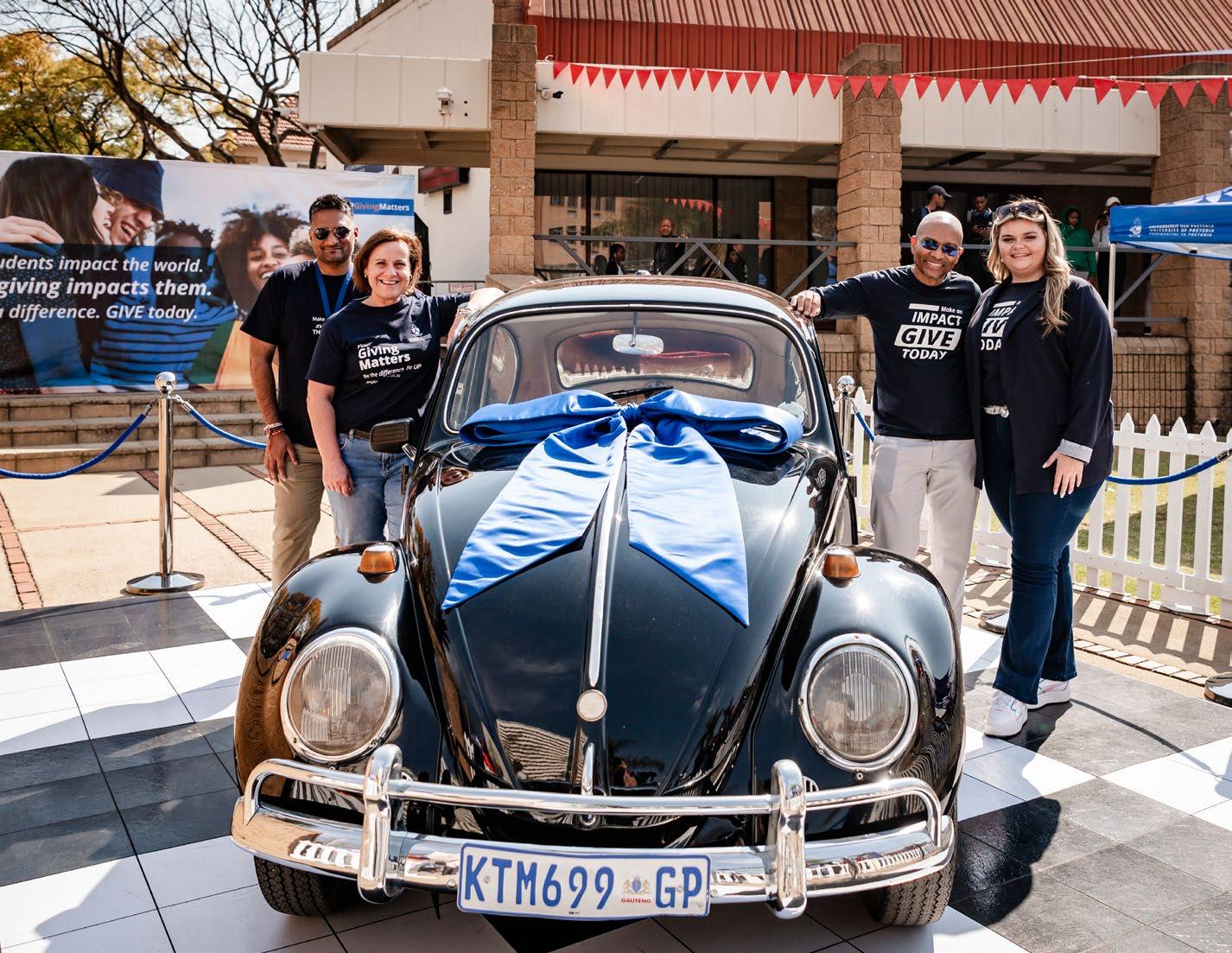
The UP Giving Matters campaign exceeded its ambitious goal of raising R100 million by 2024 to supplement the University’s day-to-day fundraising activities. By December 2024, it had raised R117.7 million which directly benefitted more than 530 students. The campaign raffled a beetle as part of its efforts.

Donald Ramphadi (right), a Paralympic medallist and wheelchair tennis champion, was named TuksSport BestMed Sportsman of the Year, while swimmer and Olympic medallist Tatjana Smith (left) earned the title of Sportswoman of the Year for the second consecutive year.
A vibrant student experience encompasses more than academic success, and we encourage and support our students to excel beyond the classroom as well. Nowhere is this more evident than in our high-performance students.
At the Paris 2024 Olympic Games, three of South Africa’s six Olympic medals were earned by UP-trained athletes: swimmer

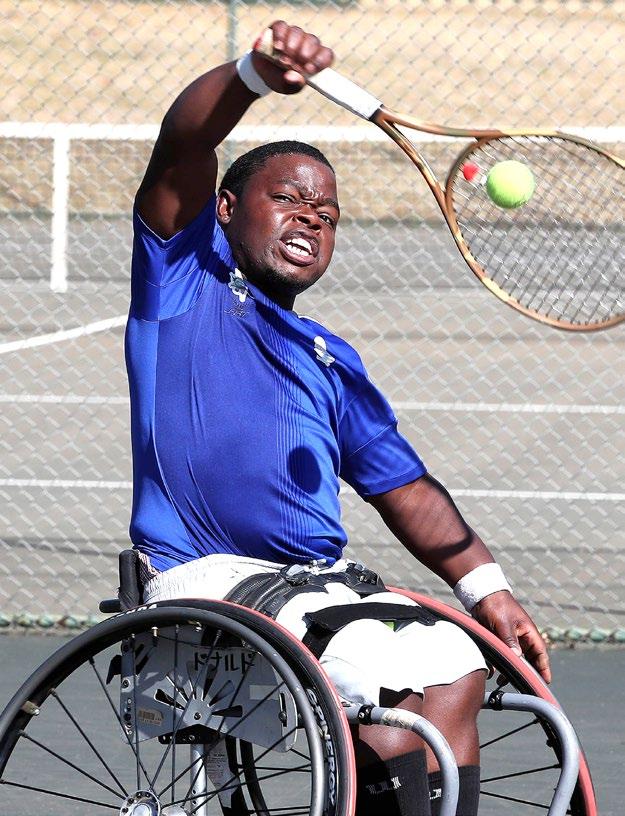
Tatjana Smith (gold and silver) and sprinter Akani Simbine (silver).
At the Paris 2024 Paralympic Games, Donald Ramphadi and Lucas Sithole made history by winning bronze in the men’s tennis quad doubles, marking the first time African wheelchair tennis players have medalled at the Games.
Tuks athletes further delivered outstanding performances in the 2024 University Sports South Africa (USSA) Championships. UP won the title of overall winner, with major successes in athletics and swimming. Medical student Charné Swart (left) was undoubtedly one of the heroes in the USSA Athletics Championships. For the third consecutive year, she won the 800 m and 1 500 m.
Encouraging a diverse campus 56 453
Total number of students enrolled
Producing successful students


The South African Graduate Employers Association (SAGEA) rates UP’s Career Services and Work Readiness Programme as the best #45 in the world for SDG8
According to the 2025 THE Impact Rankings, UP’s strategy to ensure youth employment and equip students with the skills necessary for the evolving labour market, is world-class
Source: 2025 THE Impact Rankings
The 2025 QS World University Rankings by Subject confirm UP’s global standing in the following subjects:
• Minerals & Mining Engineering (#41)
• Veterinary Science (51–60)
• Development Studies (51–100)
UP is the best place to study six subjects according to the 2025 QS Subject Rankings:
• Accounting & Finance
• Business & Management Studies
• Economics & Econometrics
• Mathematics
• Mechanical Engineering
• Veterinary Science


UP is ranked highly for producing graduates who understand the world of work and can make a valuable contribution immediately
Source: 2025 Quacquarelli Symonds (QS) World University Rankings
Since the 2012 Olympic Games in London, TuksSport’s athletes have won a total of 22 medals, making up half of Team South Africa’s haul
As one of the largest producers of research in South Africa we advance knowledge that transforms societies, drives innovation, and positions Africa as a central contributor to global solutions.


As a leading African global university, we are widely recognised for the solutions we provide through our research outputs and impactful networks. We have consistently maintained our reputation for establishing research partnerships by securing the 26th position in the world for our international research network, according to the 2025 Quacquarelli Symonds (QS) World University Rankings.
UP is also ranked among the top 50 impactful universities in the world. We achieved position 63 out of 2 318 universities from 125 regions ranked in the 2025 Times Higher Education (THE) Impact Rankings. This rates universities on the 17 United Nations Sustainable Development Goals, and their commitment to creating a sustainable and equitable future for all through research, teaching and practices.
UP is rated among the top 1% of universities globally in 14 of the 22 Essential Science Indicator (ESI) fields. These include fields such as Economics and Business, Microbiology, and Plant and Animal Sciences, where UP consistently produces the highest number of publications in South Africa. ESI statistics help identify the top 1% of scientists and published articles internationally, based on citations. As of January, 2025, a total of 308 UP-published papers were among these top papers world-wide, where UP continues to dominate the category of Plant and Animal Sciences.
Contributing to the development and well-being of people and societies informs our work across multiple levels of engagement. Two significant collaborations in 2024 promise meaningful societal impact.
The launch of the Nuclear Medicine Research Infrastructure (NuMeRI) facility marked a major milestone in public health innovation. A world-first in the field of nuclear medicine for cancer and tuberculosis (TB) drug development and clinical research, NuMeRI was established in partnership with the Ministry of Higher Education, Science and Innovation, along with other institutional collaborators. This state-of-the-art facility provides advanced diagnostic tools and treatments for some of the most pressing public health challenges.
Equally impactful is the Clusters of Research Excellence in Sustainable Food Systems (CoRE-SFS) initiative, launched
under the African Research Universities Alliance (ARUA) at UP’s Future Africa platform. CoRE-SFS brings together top researchers from 120 institutions across 42 countries, and aims to address Africa’s food security challenges through long-term scientific collaboration between African and European institutions.
We are not only part of the international conversation – we help shape it through our membership of the Worldwide Universities Network (WUN), a global higher education and research network comprising 24 leading research comprehensive universities across six continents. UP has been a member since 2021 and was the first African partner to host the WUN AGM in May 2024 (see below). The AGM was hosted in partnership with ARUA, and discussions centred on the unique research challenges faced by Africa and the contributions that African research can make to global understanding.
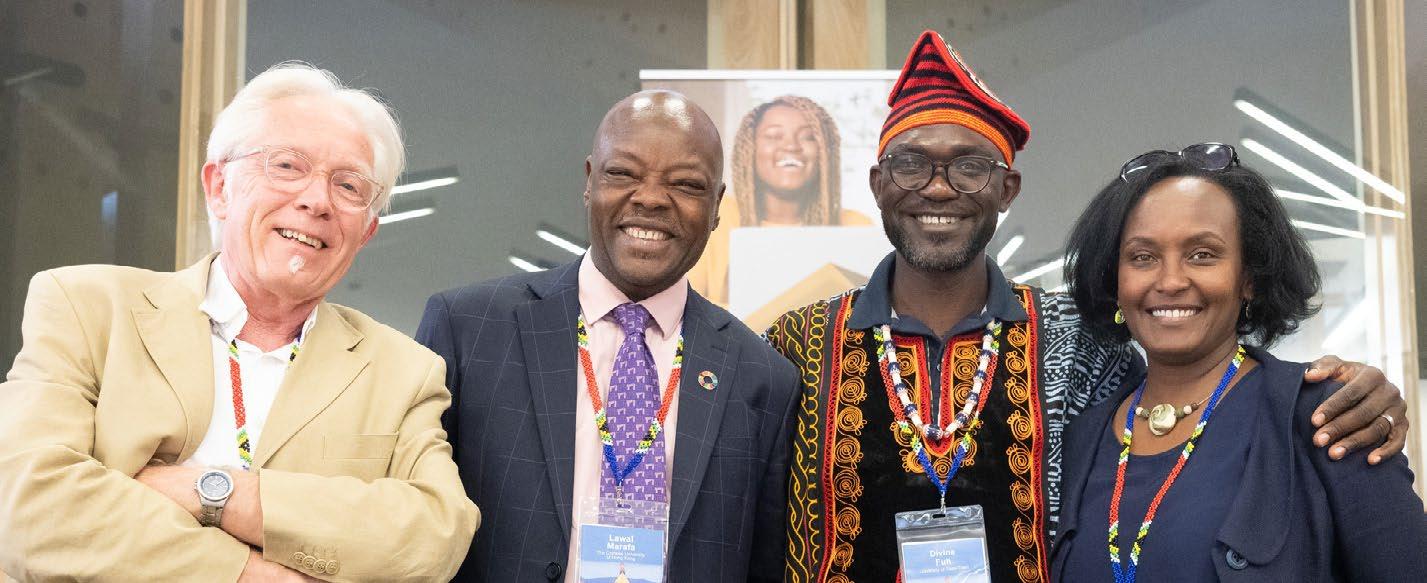
• Professor Nigel Bennett and Dr Daniel Hart, experts in mole rat evolution at UP’s Department of Zoology and Entomology, have shown how the naked mole rat is able to withstand heart attacks and fend off bowel cancer, two of the most fatal human ailments in the Global North. Their findings add to a long list of mole rat ‘superpowers’ that have already been discovered, including slower ageing, natural contraception, and the ability to bypass pain responses.
• In a first for precision agriculture, UP researchers used satellite images to produce maps of smallholder farms in Gauteng that highlight maize plants in green and weeds in red. The maps were shared with farmers to enable them to pinpoint and eradicate weeds with greater precision.
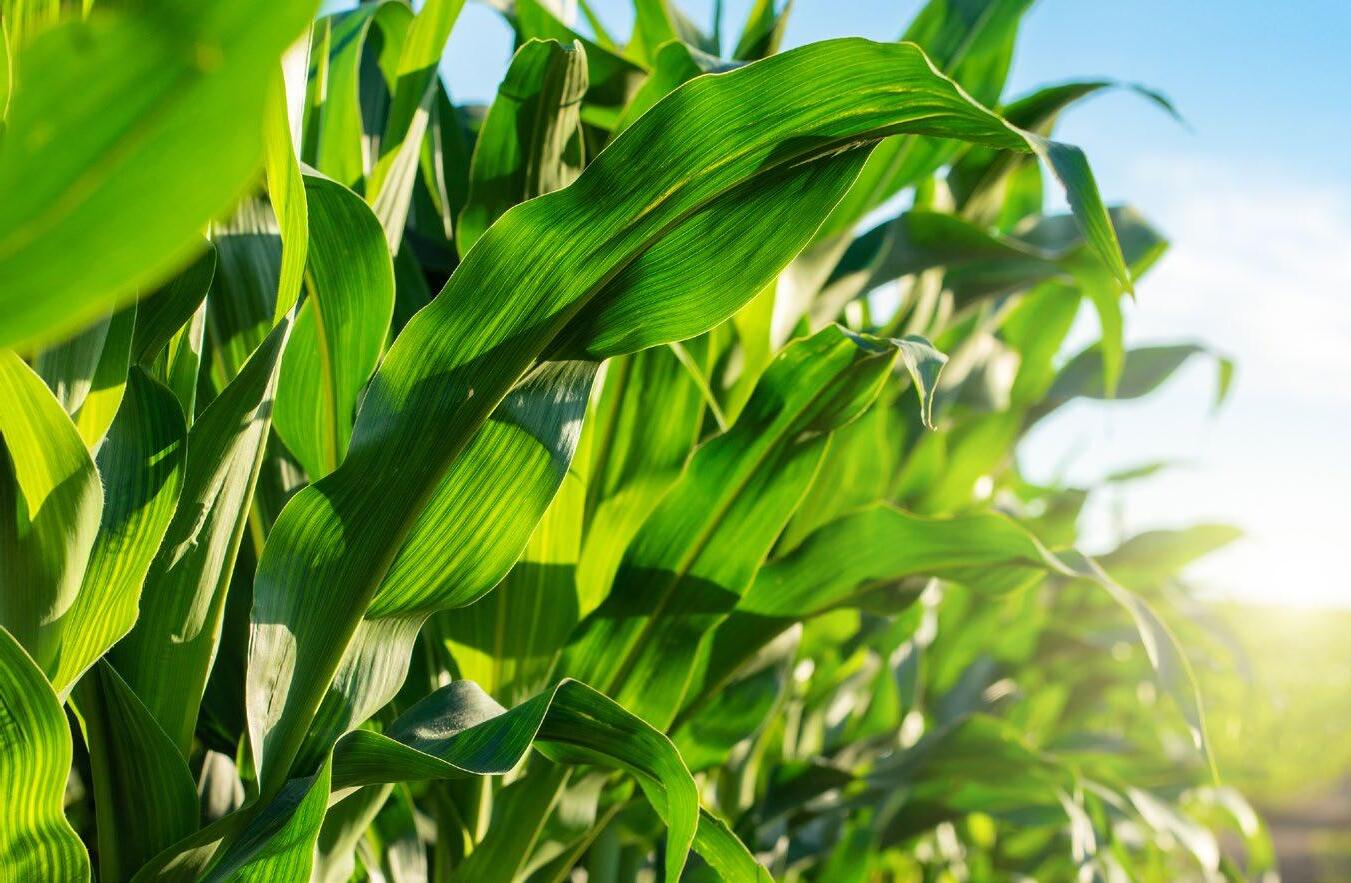
UP is an active participant in the European Union’s (EU) flagship research funding programme, Horizon Europe. Some examples in which UP researchers are participating to address pertinent local and global issues include:
Atacama Large Aperture Sub-Millimetre Telescope (AtLAST2): This project addresses two key gaps in Europe’s major astronomy projects planned for the 2030s: no advanced telescope will cover the crucial (sub-) millimetre range, and most observatories aren’t designed with sustainability in mind. The proposed AtLAST, a 50-meter telescope, aims to close both gaps. It will explore the sub-millimetre spectrum and run on sustainable, off-grid energy. Backed by a global team of 200 researchers.
Food
through Food Convergence Innovation (FCI4Africa): The FCI4Africa project helps small farmers and businesses meet trade
standards through a digital platform, while promoting food safety, economic growth, and human rights. By assessing certifications like organic, fair trade, and deforestation-free, and advising policymakers, the project aims to create fairer trade within Africa and with the EU.
Education in South Africa: This project supports collaboration between South African and European universities to improve STEM teacher education. A key outcome will be an online course with over 140 validated teaching resources and policy recommendations tailored to the South African context.

UP researchers continue to make significant contributions to their fields and, through prestigious accolades, help to elevate the University’s reputation on the global stage.
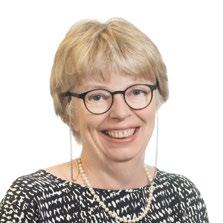
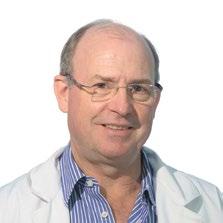
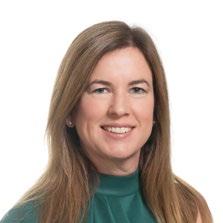


Professor Brenda Wingfield, a founding member of UP’s Forestry and Agricultural Biotechnology Institute (FABI), received the International Union of Forest Research Organizations (IUFRO) Scientific Achievement Award for her pioneering contributions to applied biotechnology in the forestry industry. Her groundbreaking work in using molecular techniques for the early and accurate detection of tree diseases has enabled more effective pathogen control measures.
Professor Mike Wingfield, also a founding member of FABI, was awarded Honorary Membership by IUFRO, the highest honour, in recognition of his leadership and service to the organisation. He served in several key roles, including as IUFRO President (2014-2019), making history as the first African to hold this position.
Professor Patricia Forbes, Rand Water Research Chair, was elected as National Representative of the Analytical Chemistry division of the International Union of Pure and Applied Chemistry. She is part of a project team assessing the state of analytical chemistry education globally, bringing her expertise to an international platform.
Professor Hettie C Schönfeldt, from the Department of Animal Science, was appointed to the High-Level Panel of Experts on Food Security and Nutrition by the Committee on World Food Security. She is the only South African appointee and brings invaluable insight from her work in nutrition and food security. She also holds a Tier 1 DSI/ NRF Research Chair in Nutrition and Food Security.
Professor Mahlatse Kgokolo, Head of Dermatology in the Faculty of Health Sciences, received the Scientific Excellence Award at the South African Health Excellence Awards for her pioneering research on xeroderma pigmentosum (XP), a rare genetic disorder, which has earned her international recognition.
The 2025 QS World University Rankings rank UP highly for its commitment to advancing global partnerships
Ranked in 14 of the 22 Essential Science Indicator (ESI) fields, with UP researchers producing the most publications within the fields of Economics and Business, Microbiology, and Plant and Animal Science within South Africa. UP is also the only university in SA to feature in Economics and Business
Source: Web of Science Essential Science Indicators 308
Number of UP-published papers that were among the top papers in the world Innovation

New invention disclosures 48
South African patents granted 92 International patents granted 4 New start-up businesses formed
Intellectual property activity 2020–2024
Source: Department of Research and Innovation





Collaboration enables us to make important advances in teaching, learning, research and innovation by building on each other’s areas of expertise.

Apart from shaping the minds that will steer the future, through our teaching and learning, we work with various role-players to shape innovative solutions to complex global and local challenges. These collaborations are essential in advancing knowledge creation, technological innovation, and the exchange of expertise, all of which align with our mission to be a globally engaged institution.
Our vision is rooted in membership of, among others, the International Association of Universities (IAU), a United Nations-endorsed body that connects about 600 member institutions from more than 130 countries. We all share the goal of enhancing the higher education community’s role and actions in advancing societies worldwide.
The partnerships we pursue reflect both global relevance and local responsiveness. These include:
University-to-university collaborations that build dynamic consortia with peer institutions across Africa and around the world, and that are grounded in joint leadership, shared learning and mutual benefit.
University-to-society engagement through partnerships with communities, NGOs and local governments, ensuring our research has real-world impact that uplifts people’s lives.
University-to-industry connections that equip our students with the skills demanded by the Fourth Industrial Revolution, and that position us at the forefront of innovation, entrepreneurship and the future of work.
International collaboration is a core focus and UP collaborates with over 3 000 institutions across the globe. Strategic partnerships, international student enrolment, international mobility, collaborative qualifications, and international co-publications are all ways in which we intentionally revitalise collective partnerships and establish new ones.
Since 2019, UP researchers have coauthored 24 595 publications with institutions across six regions. The majority of these publications were co-authored with researchers from Africa and Europe.
In 2024, we had a total of 107 active institutional-level agreements and 97 active faculty-level agreements, further strengthening our global presence and fostering academic cooperation. In addition, we formalised 46 new international agreements, enhancing collaborative efforts across various fields of research, education, and innovation.
The range of our partnerships and collaborations spans all corners of the globe: from Zhejiang University in China where we are creating innovative engineering solutions with far-reaching societal benefits, to collaborating with the RBM Partnership to End Malaria, to eliminate malaria in the SADC region.
Our influence also extends to all levels of society to ensure no one is left behind.
The 2024 UP Senate Conference emphasised the value of curricular
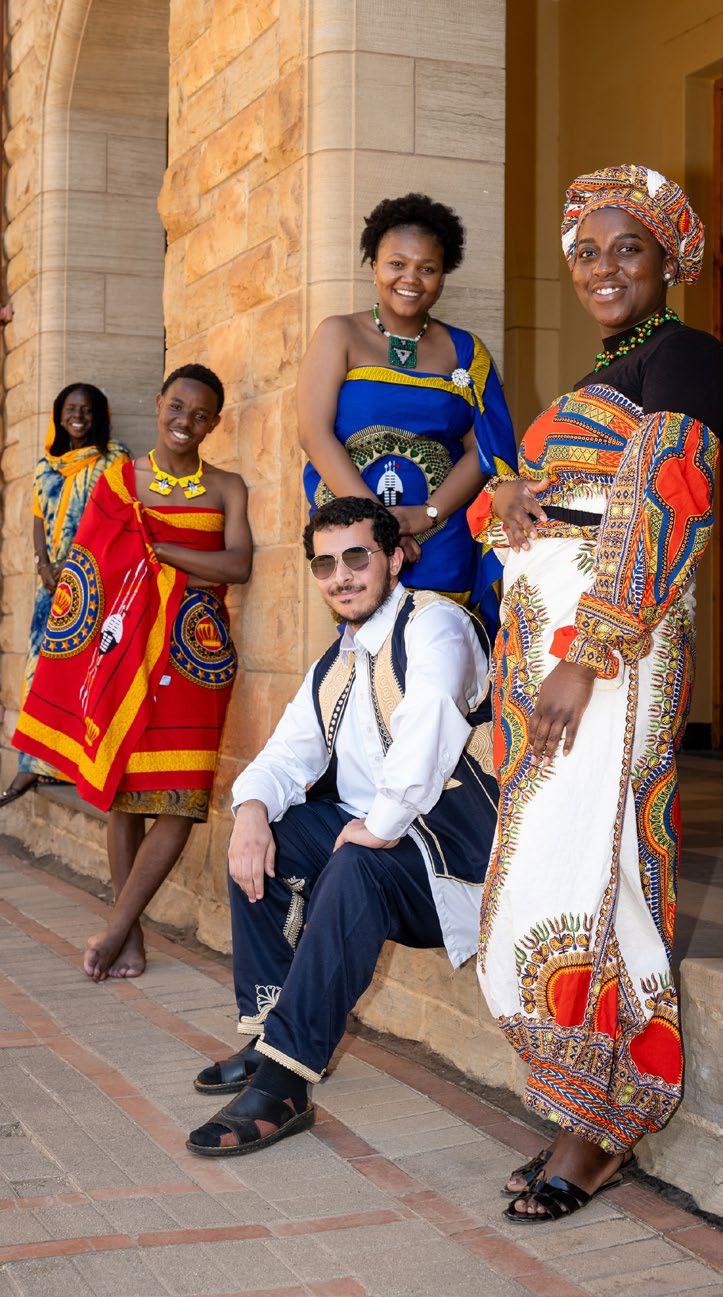
community engagement (CCE) as a way to intentionally apply resources and expertise in teaching, learning, and research to achieve mutually beneficial outcomes.
At its heart, CCE is a fundamental component of our teaching and learning. It creates a vital bridge between the University and society, integrating theory, practice, and research while fostering citizenship and lifelong learning.
We demonstrated our commitment to integrating community engagement into the curriculum in 2024, with 226 modules incorporating CCE and 19 967 students actively participating in these learning experiences. Engagement took place across a diverse range of sites, from the Eskom Expo and hospitals to welfare organisations, early childhood development centres, animal shelters, schools, clinics, farms, and nature reserves. As a two-way knowledge exchange between ourselves and our community partners, CCE ensures shared ownership and commitment to outcomes.
UP experienced another highly productive year in 2024, hosting distinguished figures from both the political and academic worlds. Just two examples are:
One of the year’s highlights was the Pan-African Universities Summit, hosted in collaboration with Times Higher Education (THE) and Stellenbosch University. The summit, centred around the theme “The Rising Expectation for Academics to Drive Change”, encouraged collaboration and innovation in academia. Around 300 university leaders from 32 countries attended the event.
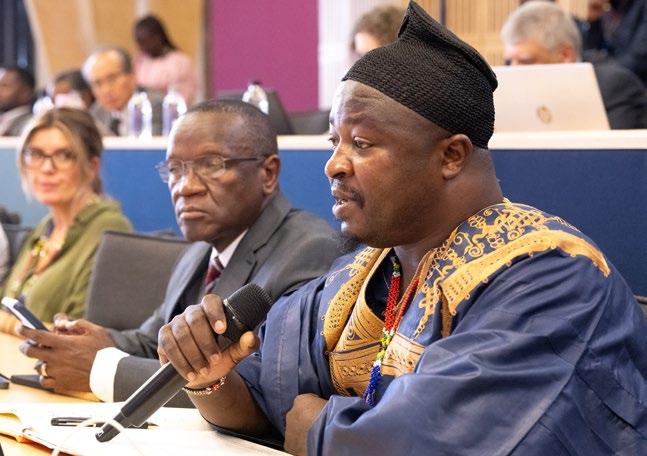

The 6th Annual Women in Science Symposium, hosted by UP, carried the theme “Women in Science Leadership: A New Era for Sustainability”. The event celebrated the crucial role that women and girls play in science – not only as beneficiaries but as active agents of change in accelerating progress towards achieving the SDGs.
Clothes to Good Students from the Department of Consumer Science work with community members to address real challenges in textile waste management.
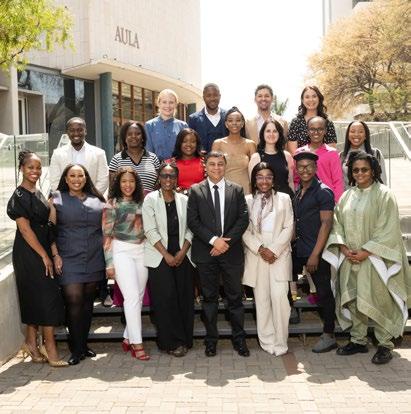
We celebrated the achievements of 19 UP-affiliated individuals who made it onto the Mail & Guardian’s 200 Young South Africans list. UP alumni accounted for approximately 9.5% of the total honourees. Since the inception of these awards, over 210 UP staff members, students, and alumni have been recognised for their efforts to create meaningful change in society.

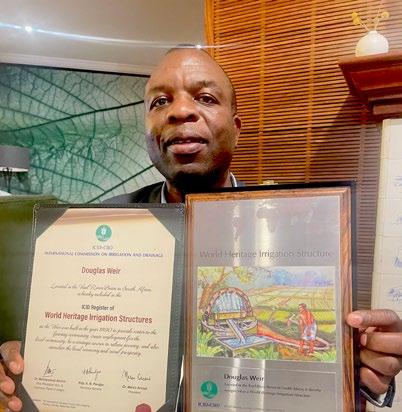
Professor Sylvester Mpandeli received the World Heritage Irrigation Structures Award in recognition of the Douglas Weir irrigation system in the Northern Cape. This was the first time South Africa had won this international award.
Prof Mpandeli holds a master’s in Irrigation and Agronomy from UP and is considered to be among the top three authors on the issue of the water-energy-food nexus.

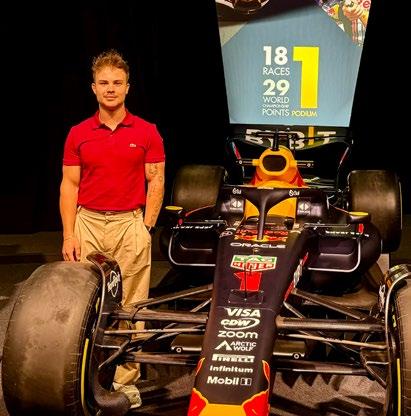
Keanan van Dyk has joined the Oracle Red Bull Racing F1’s Aerodynamics Development team. Van Dyk obtained his Bachelor of Engineering (Mechanical) degree from UP in 2022 and credits his UP studies for creating a strong basis of practical and theoretical knowledge. He followed his UP studies with a master’s degree in Aerospace Engineering from the University of Stuttgart in Germany.
Number of agreements in place


46 International level
107 Institutional level
97 Faculty level

Number of international students registered

1 131 Permanent residents 4

1 063 Undergraduates
2 039 Postgraduates
3 000
Number of institutional collaborators

334 174
Number of alumni around the world
24 595
Number of co-authored
UP students earn credits toward their degrees while working in the community
19 967 students involved in community work
226 modules that support compulsory community work
